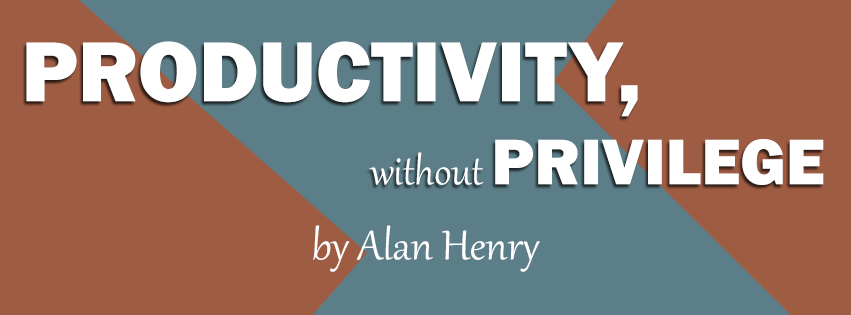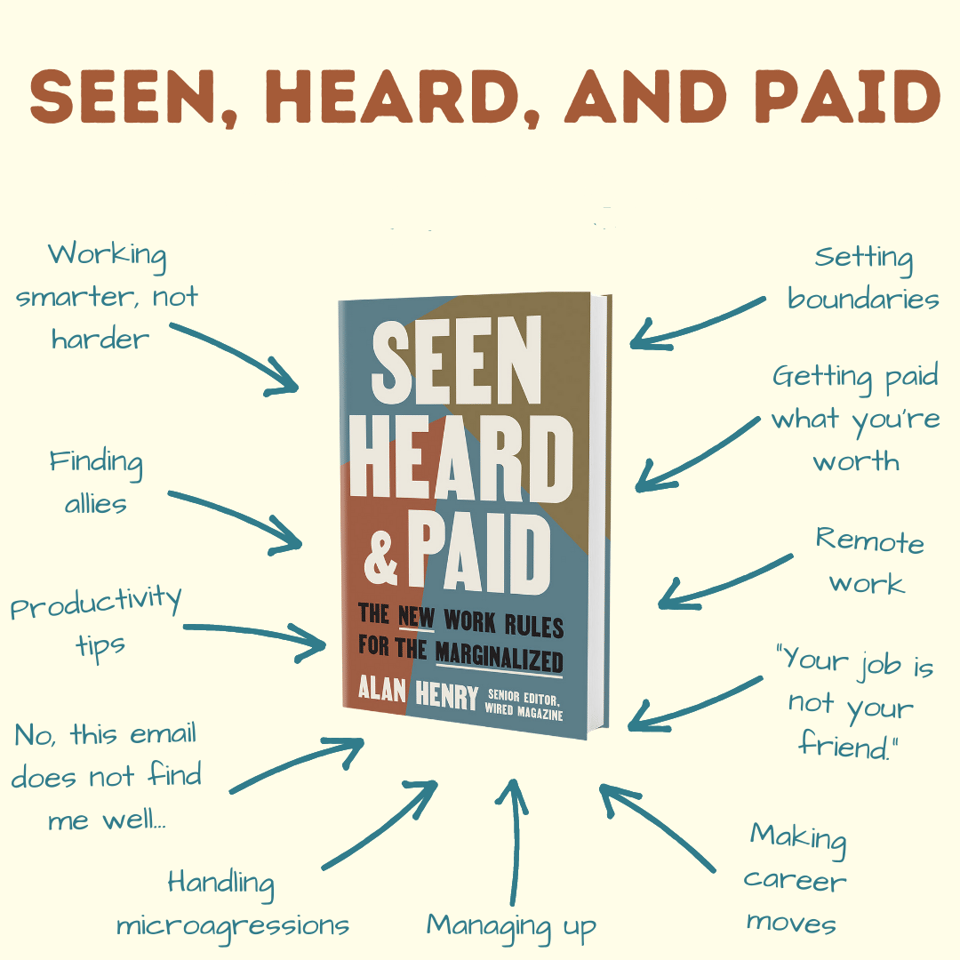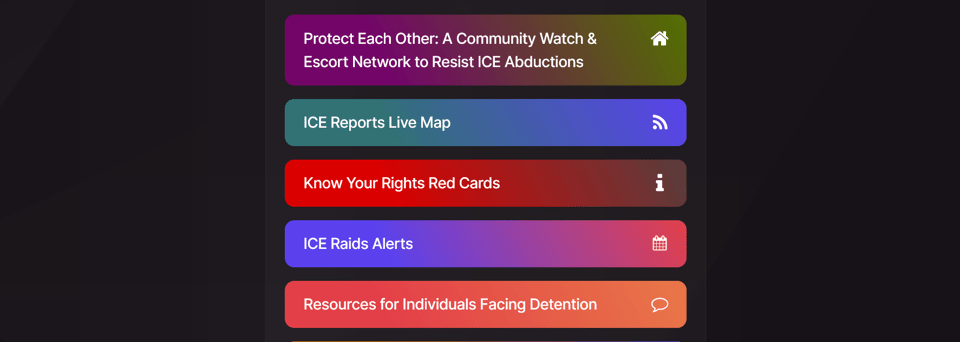Marginalized Voices Are (Still) Being Silenced

Your voice is important. It has power. That's why some people are terrified of it.
Hello! Welcome back to Productivity, Without Privilege! You know me, I’m Alan Henry, author of Seen, Heard ,and Paid: The New Work Rules for the Marginalized, which is particularly important this time around, so buy a copy! If you already have one, consider supporting me and this newsletter by either sending me a tip, or subscribing to my Patreon. I recommend you order the Manhattan, and don’t forget to tip your server or bartender.

Let’s jump right in. I don’t have much to say about the murder of a hatemonger who died by the violence he himself encouraged others to enact. I especially have no breath to waste beyond what some other very smart people have already had to say. If you’re curious where my thoughts line up on the matter, here’s a quick list of things I think you should check out if you want to be on the side of the angels for this whole thing:
This video by activist, commentator, and rapper Jay Smooth, with whom I completely and totally agree.
This piece in Indignity, a blog and newsletter run by Tom Scocca (whose praises I have absolutely sung here before).
This follow-up piece in Indignity, which moves the conversation forward to the media cowardice that defines this current moment.
And this piece in Vanity Fair by Ta-Nehisi Coates, who I think has probably the last take I plan to read on the matter.
What I don’t think you need to read is the ramblings of a man I refuse to name, because he is less a journalist than he is a builder, which may be a topic for another newsletter. I know this because the one, singular time I interacted with him, he made it clear that he had no respect for me or the journalism I did, but was only interested in building something, as in, his hunger was entirely for growth, eyeballs, clicks, notoriety, popularity, and of course, money.
Those things aren’t necessarily bad on their own, but when they’re conflated with journalism—as they have been thanks to the onward march and degradation of both the profession and the open internet (the responsible parties for both of these things are exactly who you think they are)—you end up platforming terrible people who are both intellectually dishonest and ignorant of the topics they cover. And then those same platforms praise them because of their ability to stir the pot and “bring in readers” or “launch new platforms,” which inevitably all suffer the same problems because the people building them have no interest in the truth or in serving their readers, and no curiosity to learn about the real-world impact of what they say. Just look at CBS News right now to see this in action.
But what I want to focus on this issue is more unfortunate: the fact that, despite everything, marginalized voices in media (and elsewhere, obviously) are still being brazenly silenced for the crime of telling the truth. This isn’t the “truth telling” that so-called “free speech absolutists” (who are usually anything but) prefer, either: this is the kind where the truth is based in reality, the one we all share and the one they’re in no rush to defend:
Some personal news: I've been fired from the Washington Post in the aftermath of the Charlie Kirk shooting. Thread incoming. https://substack.com/@karenattiah/note/p-173531760?utm_source=notes-share-action&r=2bz6j
— Karen Attiah (@karenattiah.bsky.social) 2025-09-15T11:07:14.308Z
I wish I could say this came as a surprise. The American journalism machine has taken a backward lurch in an attempt to survive under the current administration, to try to court an audience that does not and will not support them, and to enrich itself and the people who preside over it. All of this has come at the cost of its core mission and values, which ostensibly are to publish true things that afflict the comfortable, comfort the afflicted, and speak truth to power, in whatever corners that power may lurk. It is not and never has been, however, to “just ask questions,” to elevate lies, or to provide air, space, and eyeballs to people who trade in those things.
I could go on about how this industry, especially its biggest players, lost its nerve for those things long before I joined it, and the horror that I experienced upon discovering that for myself, but then again, I wrote a book about it. You should buy it.
I want to talk about Karen, though, especially in the context of what marginalized people go through at work—any work, not just in media or journalism. When Status obtained the termination letter that The Washington Post gave her, here’s what it said:
[contains quote post or other embedded content]
— Riley MacLeod (@rcmacleod.bsky.social) 2025-09-16T01:00:12.205Z
Ignoring the obvious “won’t someone think of the most privileged, powerful group of people on Earth” throughline in the letter, this is a classic example of the kind of open dishonesty that people of any marginalized identity—whether you’re a woman, you’re LGBTQ+, you’re disabled, you’re older in a field dominated by young people, or anone else—have to deal with.
The only difference here is that it’s normally used quietly, among the privileged, as a way to justify their distaste for having to share space with, or even suffer the presence of, someone different from them. It’s the classic “reverse racism” lie that’s been passed down and sanitized year over year, with the end goal of disconnecting discrimination from power. Doing so makes it okay to punish people for even noting discrepancies in power, privilege, and authority in action, and instead claiming that any critique of anyone under the status quo is unacceptable. It ignores how the status quo came to be, who enforces it, and who it benefits from it, in favor of sticking to a flawed interpretation of a word instead of the meaning that word carries.
So when Karen criticizes “white men” in her commentary, her fireable offense was to draw that inconvenient connection between privilege and who carries it, and how that privilege informed both the violence at its root and the reaction by the people who work to uphold it. And let’s be clear, she’s an opinion columinst—or was, and now The Post has no Black columists at all in 2025, which is itself a statement about the paper’s priorities—and her job is to offer informed commentary on the events that she covers.
So if doing your job and saying true things isn’t enough in a field that supposedly prizes truthfulness, what hope do marginalized voices have in this field, or any field?
That’s the point. The Post, and other institutions with people like the ones who made this decision at their helm, want you to think you have no hope, and you should give up now. Be quiet, get in line, don’t speak up or agitate or advocate for yourself in any way, or they’ll make your life very, very difficult. Again, ask me how I know.
I’m not just talking about political commentary either. These are the decisions behind publications that say “no, we don’t need accessibility coverage in our gaming news,” or “no, we don’t need LGBTQ+ perspectives in our culture coverage,” or “no, we don’t need to speak to a single trans person for all of these articles we’re writing about politicians banning gender affirming care,” or “no, we don’t need to mention there wasn’t a single woman on this panel about women’s health.” They’re decisions that even your favorite, must-subscribe publications make. The privilege of the people making the decisions is real, and they see no reason to question their own opinions by subjecting them to perspective, accountability, or authority. Even worse, they take offense at the very notion that they should.
Which brings me back to the final point, the one I made at the beginning of this newsletter, and the real call to action here: Your voice has power. Your voice has authority. Your lived experiences provide perspective, importance, and gravity that cannot be obtained in any other fashion, and when you encounter people who deign to speak for you without speaking to you, you have every right to refute them, and every right to take your voice somewhere that appreciates it, even if the stage isn’t as grand, or the lights as bright.
The important part is speaking up and sharing, not where you do it or who allows you to do it. Don't get me wrong; take every opportunity you can, but never ever put more emphasis on the platform than you do on the voices on it. They say more about the values of that stage than anything else.

Don’t Trust RFK Jr.? Here’s Where to Find Reliable Vaccine Information, by Jennifer Porter Gore: What’s happening to public health in America is a disaster that will take years to recover from, if indeed it ever recovers, but distrust in the medical establishment is far older than The Food Babe and Dr. Oz and their ilk, and far more justified than they are, too.
Black Americans have long had issues with a health care system that owes many of its advancements and life-saving treatments to he horrific treatment of and experimentation on Black Americans throughout this country’s history. That said, there are some things that we know to be fact, and that we know are beyond need for distrust, and vaccines are, without a doubt, one of them. This excellent piece in Word In Black outlines a wealth of useful resources for anyone rightfully worried that the official sources are being co-opted by interests with political motivations as opposed to scientific, evidence-based ones.
The Future of Cooling Was Invented Thousand of Years Ago, by Yasmin Alrabiei: There was a time not too long ago when I had some measure of hope that maybe we as a species would work together to avert the most catastrophic results of climate change, but I’m finding it difficult to hold out that hope anymore. At least until I see stories like this that remind me that there are people out there looking at ways for us to survive an ever-warming, ever more inhospitable world of our own making.
For example, one issue I’ve had difficulty squaring is the horse race between a warming world and our collective need to stay cool. The world is going to only get warmer, and the summers are only going to get longer and hotter, and we’re all going to want to run our air conditioners more, especially those of us in countries used to the luxury and comfort of A/C. So what do we do, for those of us who are both worried about the climate and the costs (both socially and financially) of cooling? Well, the ancients left us some suggestions, if we’re willing to look past our history of colonialism to see them. I love Atmos, I really do.
"Quickling": Learn the Quick Pickle Technique and Use It Forever, by Kate Bernot: Look, it’s not all social commentary and politics around here; sometimes you just have some vegetables you need to hang on to for a bit. Or you just want a good pickle in your life, and I’ll never say no to a good pickle. I’m a big fan of quick pickling everything from cucumbers to garlic to red onions, and this guide from America’s Test Kitchen was perfect for me.
I don’t want to say I’ve never done it before reading this, but I will admit that reading this encouraged me to do it better than I had been. Instead of just popping everything in a jar with some vinegar and spices and hoping for the best (or eating it fast enough that it wouldn’t make a difference,) the approach here is a bit more repeatable, and probably better for flavor and the longevity of the produce I want to pickle. So with summer winding down and cooler weather on the horizon, maybe it’s time to do a little pickling with those garden or farmer’s market finds, yeah?


When I was at Lifehacker, not just when I was editor in chief, but when I was a staff writer, we ran a series of stories tagged “know your rights.” It was always kind of in the Lifehacker ethos back then that while tips and tools to get things done were the primary mission, giving you any and all information you could use to better navigate your life—things that other people wouldn’t teach you or tell you until it was too late—was also part of our mission. So consider this in that same vein, and bookmark Resist Ice.
It’s a simple, one-page Caard site with information relevant to every American citizen right now. Whether or not you think you’ll be personally targeted by ICE, it’s important for all of us to know what our rights are under the law—if not for ourselves, for our neighbors, our families, our friends, and our communities. There’s also a graphic at the bottom on how to prepare for a protest.
I think it’s pretty obvious that I’m of the mindset that if a government is willing to violate the rights of any individual or group of people, they’re willing to do it to you if they can come up with a reason to. I’m also of the opinion that saying “they can’t do that, it’s illegal,” isn’t enough to stop people from doing things. After all, without accountability and equal enforcement, well, you see where this goes.
Bookmark it, share it with your networks, especially with people of marginalized groups, who are under ever more threat and surveillance in our current social climate, and I hope you and they never need it.
***
That’s certainly enough from me. Next time we’ll get back to the actionable tips to help you with your career, but this time I had to approach this specific topic. After all, if you don’t have a career because you’re being marginalized or outright discriminated against, especially if it’s to make the most privileged people around you comfortable at the expense of the truth, there are no productivity tips that can help.
If you enjoyed this newsletter, send it to a friend and tell them to subscribe! If you really love what I’m doing, feel free to support me by dropping me a tip here, or by subscribing to my Patreon here for early access to this newsletter, as well as some other treats.
Take care of yourselves, and I’ll see you back here soon.